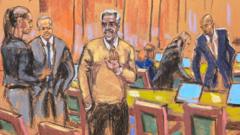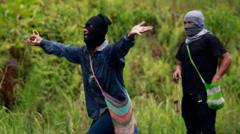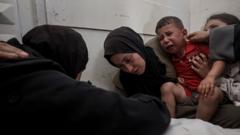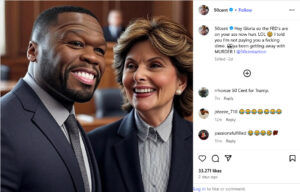While prosecutors have assembled a critical case against rapper Diddy with compelling testimonies and evidence of abuse, uncertainties remain ahead of the defense's arguments.
Analyzing the Case Against Diddy: A Legal Perspective
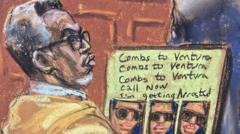
Analyzing the Case Against Diddy: A Legal Perspective
As the prosecution concludes its case in the high-profile trial of Sean "Diddy" Combs, we delve into the strengths and weaknesses of the charges against him.
The courtroom drama surrounding rapper Sean "Diddy" Combs continues as prosecutors rest their case in a federal trial focused on sex trafficking and racketeering charges against the music mogul. Throughout the trial, which has lasted several weeks, the government has accused the 55-year-old artist of using his influential position to facilitate the trafficking of women and concealing his illegal actions. Although Mr. Combs has admitted to past incidents of domestic violence, he maintains a plea of not guilty to the specific charges levied against him.
The case has seen more than 30 witnesses, including ex-girlfriend Casandra Ventura, also known as Cassie, and rapper Kid Cudi, providing testimony regarding Mr. Combs's alleged abusive behavior. Cassie supplied crucial evidence, detailing a tumultuous 11-year relationship filled with violence and emotional manipulation. Her poignant testimony, delivered while she was eight months pregnant, described instances where she was coerced into sexual encounters known as "freak-offs," watched and filmed by Mr. Combs.
In support of their claims, prosecutors presented surveillance footage depicting Mr. Combs assaulting Cassie in a hotel and security guard testimonies confirming an attempt to hide the evidence. Videos and photos graphically illustrating Cassie's injuries reinforced the narrative of abuse, making her testimony vital in establishing a case of sex trafficking that carries severe penalties, including life imprisonment.
Another key witness, referred to as "Jane," corroborated Cassie's experiences, testifying about similar pressures she faced in her relationship with Mr. Combs. However, jurors also saw affectionate text messages between Mr. Combs and both women, which may complicate the interpretation of the alleged coercion.
Legal experts imply that the mixed nature of the evidence could challenge the prosecution's case. Compounding this uncertainty, the prosecution lost a potential witness before the trial concluded, which could weaken their assertion of a pattern of behavior. Former prosecutor Neama Rahmani emphasized that while convincing multiple victims is advantageous, the absence of testimony from one can be detrimental.
In addition to sexual abuse allegations, Mr. Combs faces significant charges of racketeering, claiming he operated a "criminal enterprise" with the help of employees to facilitate his abuse. Under the Racketeer Influenced and Corrupt Organizations Act (RICO) intended for mob-related prosecutions, the complexity of this charge may prove challenging to communicate to jurors, possibly hindering a conviction.
As the defense prepares to take the stage, challenges loom. Mr. Combs's attorneys plan to forgo calling witnesses, including Mr. Combs himself, a move that avoids the risks of cross-examination but may also forfeit opportunities to directly counter the prosecution's narrative. Experts predict the defense's strategy will hinge on undermining the broader conspiracy implications rather than discrediting individual witnesses.
Ultimately, while the prosecution has laid out a considerable array of evidence, the outcome of the trial remains uncertain, hinging on the jury's interpretation of the complexities and nuances presented throughout the proceedings. The legal saga continues as both sides gear up for the next phase of deliberations.
The case has seen more than 30 witnesses, including ex-girlfriend Casandra Ventura, also known as Cassie, and rapper Kid Cudi, providing testimony regarding Mr. Combs's alleged abusive behavior. Cassie supplied crucial evidence, detailing a tumultuous 11-year relationship filled with violence and emotional manipulation. Her poignant testimony, delivered while she was eight months pregnant, described instances where she was coerced into sexual encounters known as "freak-offs," watched and filmed by Mr. Combs.
In support of their claims, prosecutors presented surveillance footage depicting Mr. Combs assaulting Cassie in a hotel and security guard testimonies confirming an attempt to hide the evidence. Videos and photos graphically illustrating Cassie's injuries reinforced the narrative of abuse, making her testimony vital in establishing a case of sex trafficking that carries severe penalties, including life imprisonment.
Another key witness, referred to as "Jane," corroborated Cassie's experiences, testifying about similar pressures she faced in her relationship with Mr. Combs. However, jurors also saw affectionate text messages between Mr. Combs and both women, which may complicate the interpretation of the alleged coercion.
Legal experts imply that the mixed nature of the evidence could challenge the prosecution's case. Compounding this uncertainty, the prosecution lost a potential witness before the trial concluded, which could weaken their assertion of a pattern of behavior. Former prosecutor Neama Rahmani emphasized that while convincing multiple victims is advantageous, the absence of testimony from one can be detrimental.
In addition to sexual abuse allegations, Mr. Combs faces significant charges of racketeering, claiming he operated a "criminal enterprise" with the help of employees to facilitate his abuse. Under the Racketeer Influenced and Corrupt Organizations Act (RICO) intended for mob-related prosecutions, the complexity of this charge may prove challenging to communicate to jurors, possibly hindering a conviction.
As the defense prepares to take the stage, challenges loom. Mr. Combs's attorneys plan to forgo calling witnesses, including Mr. Combs himself, a move that avoids the risks of cross-examination but may also forfeit opportunities to directly counter the prosecution's narrative. Experts predict the defense's strategy will hinge on undermining the broader conspiracy implications rather than discrediting individual witnesses.
Ultimately, while the prosecution has laid out a considerable array of evidence, the outcome of the trial remains uncertain, hinging on the jury's interpretation of the complexities and nuances presented throughout the proceedings. The legal saga continues as both sides gear up for the next phase of deliberations.



